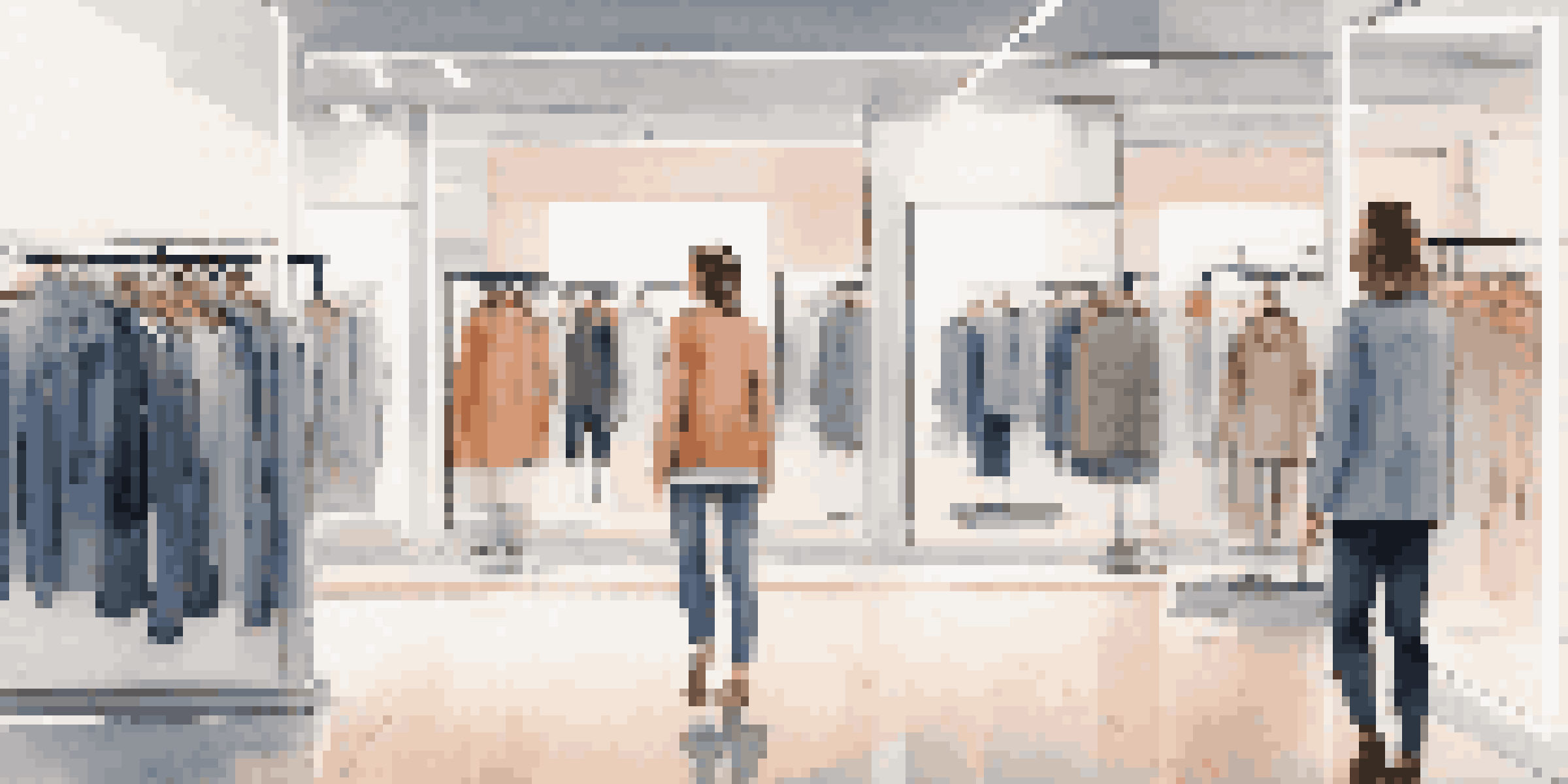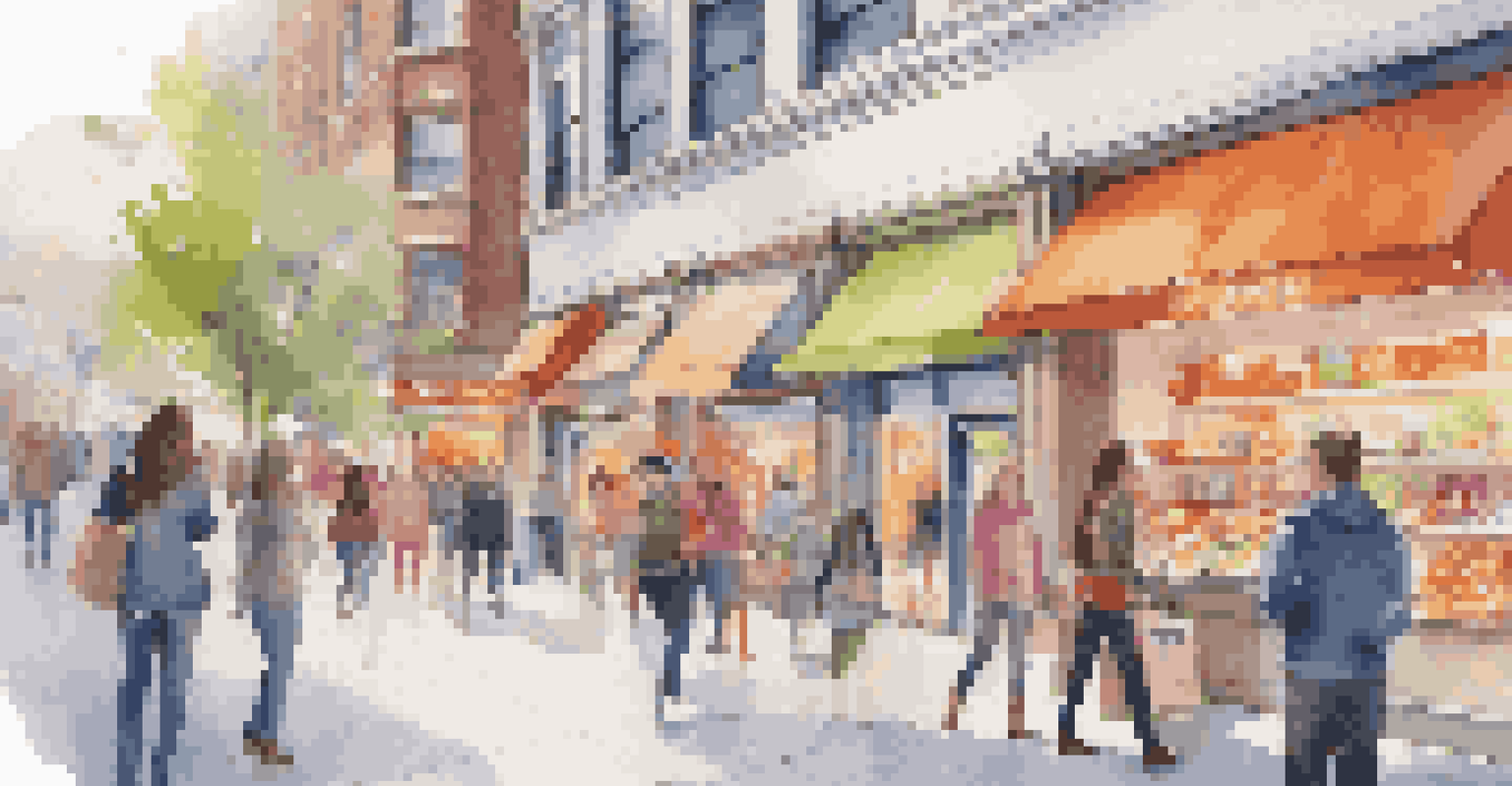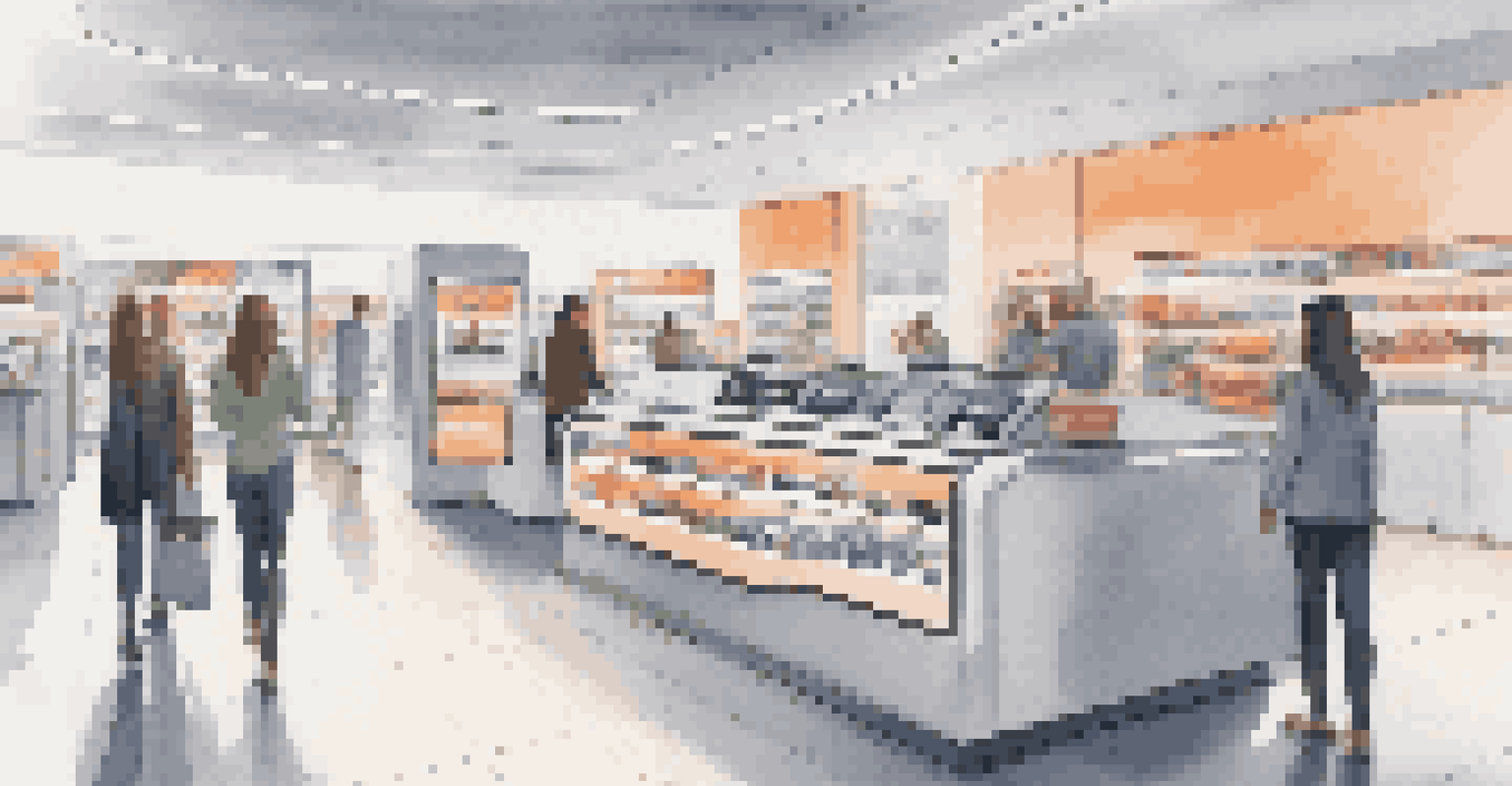Role of IoT in Enhancing Urban Retail Experiences

Understanding IoT and Its Impact on Urban Retail
The Internet of Things, or IoT, refers to the network of interconnected devices that communicate and share data. In urban retail, this technology plays a crucial role in creating seamless shopping experiences. Imagine walking into a store where your smartphone connects to various sensors, guiding you to the products you want without any hassle.
The Internet of Things is not a trend, it's a tool for creating better experiences.
Retailers can gather valuable data on customer preferences and behaviors through IoT devices. This information helps businesses tailor their offerings, ensuring that shoppers find what they need quickly. By understanding trends and habits, retailers can enhance their marketing strategies and improve inventory management.
Ultimately, IoT transforms the retail landscape by providing a more personalized shopping journey. Customers feel valued when retailers understand their needs, leading to increased loyalty and satisfaction. As urban areas become more crowded, these smart solutions are essential for thriving in the competitive retail environment.
Personalized Shopping Experiences Through IoT
One of the standout features of IoT in retail is its ability to create personalized shopping experiences for customers. For example, smart mirrors in clothing stores can suggest outfits based on what you try on and even show how they look on you. This technology not only saves time but also enhances the overall shopping experience.

Moreover, retailers can use customer data to send personalized offers and promotions directly to smartphones. Imagine receiving a notification on your phone about a sale on your favorite brand as you walk past the store. This level of personalization makes customers feel appreciated and encourages them to make a purchase.
IoT Enhances Retail Personalization
IoT technology enables retailers to create personalized shopping experiences, making customers feel valued and encouraging loyalty.
By harnessing IoT, retailers can build stronger relationships with customers, ultimately leading to increased sales and higher customer retention. When shoppers feel acknowledged and catered to, they are more likely to return, transforming one-time buyers into loyal patrons.
Streamlining Inventory Management with IoT
IoT technology greatly streamlines inventory management, which is vital for urban retailers facing high demand. Smart shelves equipped with sensors can monitor stock levels in real-time, automatically alerting staff when items need restocking. This ensures that popular products are always available for customers.
Data is the new oil; it's valuable but if unrefined it cannot really be used.
Additionally, IoT devices can track inventory movement throughout the supply chain, providing insights into sales trends and product performance. Retailers can make informed decisions about which items to promote or discontinue based on this data. Such proactive management minimizes waste and maximizes profit.
As a result, efficient inventory management leads to improved customer satisfaction. Shoppers are less likely to leave empty-handed when their desired products are readily available. By utilizing IoT, urban retailers create a smoother shopping experience that benefits both the business and the consumer.
Enhancing Customer Engagement through Smart Devices
Smart devices, such as beacons and interactive kiosks, are revolutionizing customer engagement in urban retail. Beacons can send location-based notifications to shoppers about sales or new arrivals as they move through a store. This engages customers and encourages them to explore different sections of the retail space.
Interactive kiosks allow customers to find product information and check availability without needing to ask store staff. This self-service feature not only saves time but also empowers customers by giving them control over their shopping experience. It’s a win-win for both the retailer and the shopper.
Streamlined Inventory Management
Smart devices help retailers manage inventory efficiently, ensuring popular products are always available and minimizing waste.
By integrating these smart devices, retailers can create dynamic, engaging environments that capture customer interest. Increased engagement often leads to higher conversion rates, as shoppers are more likely to make purchases when they feel connected to the brand.
Data-Driven Decision Making in Urban Retail
The data collected through IoT devices enables retailers to make informed, data-driven decisions. From analyzing foot traffic patterns to understanding peak shopping times, this information provides valuable insights. Retailers can adjust staffing levels and promotional strategies based on hard data rather than guesswork.
In addition to immediate sales strategies, long-term planning benefits from data analysis as well. Retailers can identify trends that impact future inventory choices and marketing campaigns. By continuously monitoring customer interactions, businesses can adapt to changing preferences and stay ahead of competitors.
Ultimately, embracing data-driven decision-making fosters a culture of continuous improvement. Retailers who leverage data effectively can respond quickly to market shifts and enhance their overall performance in urban retail.
Creating Seamless Omnichannel Experiences with IoT
In today's retail landscape, customers expect a seamless experience across various channels. IoT technology facilitates this by connecting online and offline shopping experiences. For instance, customers can check product availability online before visiting the physical store, ensuring a smooth shopping journey.
Furthermore, retailers can use IoT to track customer interactions across different platforms. This data allows businesses to understand customer preferences and tailor their marketing efforts accordingly. Imagine receiving personalized recommendations based on both your online and in-store shopping history.
Sustainability Through IoT Solutions
IoT facilitates eco-friendly practices in retail, helping businesses reduce waste and appeal to environmentally conscious consumers.
By providing a consistent and integrated experience, retailers can build stronger connections with customers. This omnichannel approach not only enhances satisfaction but also encourages repeat business, as shoppers appreciate the convenience of a unified shopping experience.
Sustainability Benefits of IoT in Urban Retail
Sustainability is a growing concern for consumers, and IoT can play a significant role in helping urban retailers become more eco-friendly. Smart energy management systems can monitor and optimize energy consumption in stores, reducing waste and lowering utility costs. This not only benefits the environment but also improves the retailer's bottom line.
Additionally, IoT can help retailers track and manage their supply chains more responsibly. By analyzing data on sourcing and transportation, businesses can make more sustainable choices, such as selecting local suppliers or reducing carbon footprints. These efforts resonate with environmentally conscious consumers, enhancing brand loyalty.

Ultimately, adopting sustainable practices through IoT not only appeals to customers but also contributes to the greater good. Retailers who prioritize sustainability can differentiate themselves in the crowded urban market, attracting shoppers who value eco-friendly initiatives.
Future Trends of IoT in Urban Retail
As technology continues to evolve, the future of IoT in urban retail looks promising. Innovations such as augmented reality (AR) and artificial intelligence (AI) are set to further enhance the shopping experience. Imagine trying on clothes virtually through AR before making a purchase, making shopping more convenient and fun.
Moreover, advancements in IoT will likely lead to even smarter stores, where devices communicate seamlessly to create an intuitive retail environment. Features like automated checkout and personalized shopping assistants could soon become the norm, transforming how we think about shopping.
As urban areas grow and consumer expectations shift, retailers must adapt to stay relevant. Embracing these future trends will ensure that businesses remain competitive and continue to provide exceptional experiences for their customers.